We live in apocalyptic times, that is, times when we realize that the prevailing order is unstable, that our idols have feet of clay or our houses are built on sand or whatever other Biblical metaphor comes to mind. This old book review of mine (from 2012!) reflects on an older, much more severe cultural crisis:
Last week I read Hella Haasse’s The Scarlet City, a book of historical fiction about the months leading up to the sack of Rome in 1527, when the troops of the German Emperor Charles V went on a month long spree of looting, rape, murder and arson in the Eternal City.
The early 1500’s marked the final collapse of Medieval Europe and the birth of modernity: in France, England and Spain, the feudal system was replaced by the nation-state; the religious consensus of all Western Europe was broken up by the Protestant Reformation; and the idealistic approach to studies like science, philosophy or history was replaced by a pragmatic, utilitarian one. The book is full of historical figures who represent this civilizational shift: Machiavelli, Michelangelo, Loyola; men with one foot in the medieval world, and the other in the modern.
The main character is Giovanni Borgia, a minor historical figure who spends the novel trying to unravel the mystery of his birth: he may have been the grandson of Pope Alexander VI (Rodrigo Borgia), or perhaps the Pope’s son, or perhaps (given the insinuations of incest that surrounded the Borgia family) both the Pope’s son and grandson (yeah, icky). All he knows for sure is that he is a bastard, and the few surviving members of the Borgia family are not telling him anything.
Back then becoming a bishop was considered a good career choice for the illegitimate sons of noblemen, and no one was surprised if the Bishop or Cardinal had a few illegitimate kids of his own running around the Cathedral. Old Rodrigo devoted most of his efforts as Pope to setting up his bastards as princes in the little kingdoms and duchies of Italy, and was not above starting wars and assassinating rivals to do it.
The fact that in the 1500’s a man like Rodrigo Borgia could have become Pope was a sign of cultural collapse. Even as Italy was flourishing economically and producing the artistic glories of the Renaissance, its religious institutions were a sham, its governments were paralyzed by betrayal, violence and indecision, and the private lives of the people were full of financial and sexual excess. This is the atmosphere that The Scarlet City captures: there is an sense of impending doom and inevitable decline, so everybody is throwing morals out the window and trying to grasp as much power, money and sex as they can before their world comes crashing down.
(I hate to inject politics into the whole discussion, but when you look at the games our politicians play, their incapacity to propose solutions to real problems, the utterly venial causes to which they devote themselves, and the swinish nature of election campaigns, you have to wonder if they feel the same mixture of greed and incapacity to act that those Italian princes felt.)
I lived in Rome for a few years and the effects of the nightmarish summer of 1527 are still felt: it was the end of the Roman Renaissance and of the party atmosphere at the Vatican. Pope Paul III asked Michelangelo to paint his haunting Last Judgement and called the Council of Trent, one of the few Church Councils that actually achieved reform. Ignacio de Loyola and his Jesuits opened the city’s first modern college, the Gregorian University.
The only caution I have in recommending The Scarlet City is that it helps to have a good grasp of European history and some knowledge of Renaissance art before reading it unless you want to be running to the encyclopedia every five minutes to find out about the Battle of Pavia, Vittoria Collona, or famous Roman prostitutes. It would be a great book to read in conjunction with a course on the Renaissance or a vacation in Rome.


Excellent- and impressive.